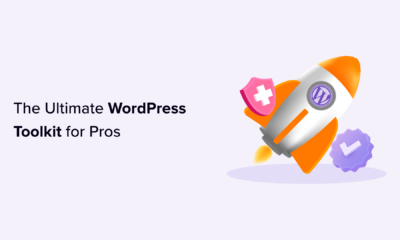SEO
10 Remarketing Tools For Reengaging & Winning The Conversion
Remarketing tools effectively direct advertisements to people who have already shown an interest in your business.
Your team might consider remarketing as a way to reengage with customers to get them to revisit your site, this time resulting in a conversion.
To effectively remarket, businesses must rely on data such as how the consumer interacted with their site and the items they were interested in during their visit.
This method allows ads and promotions to be personalized based on the customer’s needs.
Remarketing can help your brand interact with a relevant audience.
With Google phasing out third-party cookies, marketers will need to find first-party data to dictate their marketing campaigns better.
Let’s look at some available tools to turn window shoppers into paying customers.
1. Google Ads Remarketing
For businesses that advertise using Google, adding the remarketing component is a great way to promote your brand to customers who have visited your website before.
When you add the remarketing tag to your website, the customers who visit your site become part of an audience group.
You can tailor your ads to the needs of individuals in a particular audience based on their actions on your site.
Since Google has such a vast user base, you can reach many potential buyers through remarketing campaigns.
Google also allows ads to run as text, images, and video, creating opportunities to engage with customers.
Google ads help people revisit their buying journey, wherever they left off with your brand.
Pros:
- Easily integrates with existing Google Ads.
- Allows for remarketing across Google devices.
Cons:
- Ad frequency can become annoying to potential customers.
- With changes in policy for cookies, some aspects are still being finalized (ex: Dynamic Remarketing is not yet available on Google Analytics 4).
Pricing: PPC for remarketing is typically between $0.65 to $1.25 per click.
2. AdRoll
AdRoll offers an advertising platform that helps businesses retarget buyers who have visited your site but didn’t convert. It boasts a cross-channel performance dashboard that allows your marketing team to run ads across multiple networks.
Using AI, they make predictions based on years of experience to help increase conversions and optimize ROI.
AdRoll Pixel is added to your website to track visitor behaviors. This allows personalized ads for the products that initially brought the consumer to your site.
It also meets the potential buyer where they left off in the buying process.
Remarketing ads can be used across more than 500 networks, whether users are on a laptop, phone, Google, Yahoo, Facebook, or Instagram.
Besides ads, AdRoll also sends emails about what interested the shopper. This encourages shoppers to return to your site to complete the purchase.
Pros:
- The interface is easy to learn.
- Ads are easily customized and offer a variety of templates.
Cons:
- Customer service can be slow to deliver answers.
- Lacks real-time reporting.
Pricing: Costs are calculated based on your website’s number of unique monthly visitors. Example: For 5,000 monthly visitors, the price is $72/month.
3. Mailchimp
Mailchimp specializes in engaging with customers through relevant and informed emails.
Through their automation, they can seamlessly send the right message at the right time to remarket to potential buyers.
Mailchimp is unique in setting up customer journeys to control the message sent out along the buying process.
Among the most beneficial for remarketing are the abandoned cart emails that remind customers of items left in their cart.
In addition, product retargeting emails remind people to come back and revisit items they had previously viewed on your site.
The services available through Mailchimp work in the background to help increase sales of your products.
Product recommendations are also built into the remarketing emails, so prospective buyers see related items.
Pros:
- Easy to use with tutorials and help resources available.
- Free for businesses with less than 2,000 contacts.
- Built with small business in mind.
Cons:
- Lacks automation for organizing contact database.
- Limited templates.
Pricing: Cost is dependent on the number of contacts you have.
For a 1,500-contact plan, there are the following options:
- Free Plan (Businesses with less than 2,000 contacts).
- Essentials for $23/month.
- Standard for $59/month.
- Premium for $299/month.
4. ConvertFlow
ConvertFlow prioritizes personalization for customers throughout their entire journey. Through insightful automation, website visitors are tagged and segmented based on their behavior.
This helps target them with the right campaign or email marketing tool to win the conversion.
For returning customers, ConvertFlow offers personalized CTAs, showing relevant products to complete the sale.
This tool also personalizes the journey based on a visitor’s company name and job title to help secure lucrative accounts.
Pros:
- Relevant targeting throughout the entire customer journey.
- It does not require coding experience.
Cons:
- Occasional loading delays.
- Comprehensive tools can be overwhelming without adequate customer support.
- Costly for small businesses.
Pricing: A free trial is offered for 250 conversions and a 14-day free trial for Pro Plan.
After your trial, choose between one of three plans:
- Pro Plan costs $99/month (10,000 monthly visitors).
- Teams Plan costs $300/month (10,000 monthly visitors).
- Business Plan costs $800/month (100,000 monthly visitors).
5. Facebook Custom Audiences
Facebook Custom Audiences allows your business to advertise directly to Facebook users who have already interacted with your brand.
It relies on your website or Facebook data to create relevant ads.
Remarketing tactics can engage with users who have previously viewed your post. Depending on their actions, ads are made specifically for the user at their particular place in the buying process.
Pros:
- It makes your Facebook advertisements more effective.
- Effective at combating cart abandonment.
Cons:
- Facebook users are logging in for social reasons, not necessarily looking to shop.
- Specific to a small group of users who have already interacted with your posts.
Pricing: The cost is based on your ad budget, CPC, and CPM cost basis.
6. Criteo
Criteo boasts dynamic retargeting advertisements that utilize sophisticated technology.
Instead of just reminding a website visitor of a product they viewed, the advertisements can target other products likely to lead to a conversion.
Their technology has excellent product recommendations and can track customers across channels to browse your site and the competition.
Criteo maximizes ROI by predicting when a shopper is most likely to convert.
Then, it personalizes ads with creative optimization with engaging ad layouts, colors, and a call to action that will influence the individual consumer.
Pros:
- The algorithm works to increase conversions.
- Tailored ads support the customer’s buying journey.
Cons:
Pricing: The cost is based on your ad budget, CPC, and CPM cost basis (similar to Google Ads), so it varies greatly.
7. Fixel
Fixel focuses on remarketing through data-driven tactics, relying on segmentation to ensure your audience gets the right ad to convert.
Using AI, a code is added to your website and can be integrated with platforms you are already using (Google Ads, Pinterest Ads, etc.).
Fixel then helps you zero in on users with a higher purchasing intent.
This tool is fine-tuned for remarketing as it reduces spending on “browsers” and focuses on serious people about your product.
Pros:
- Uses your advertising budget to target users who are more likely to convert.
- Code can be quickly added to the website; a painless startup.
Cons:
- A smaller population of people targeted through this segmentation method.
- Some knowledge of remarketing is necessary to understand the platform.
Pricing: Self Serve Plans start at $69/month.
8. ReTargeter
ReTargeter offers three products specific to retargeting audiences.
First, similar to other tools we’ve listed, a piece of code is added to your site to help reengage visitors after they have left your site.
ReTargeter is dedicated to user privacy, collecting vital personalized data while using anonymous ids. This keeps the consumer’s data safe while being targeted while they browse online.
ReTargeter also offers search retargeting to reach users who are still searching for products like yours even after they have left your website.
Your team enters a list of keywords, and the advanced technology takes over to find audiences that match your search words.
Again, this helps reach customers interested in your product without paying for search clicks.
Pros:
- Dedicated to retargeting (site, CRM, and search).
- Aligns with the latest industry privacy standards.
Cons:
- It does not offer a free trial.
- Limited customer support.
Pricing: $1500/month, per user model.
9. Wunderkind Audiences
Wunderkind is on a mission to provide the most individualized advertising to your customer by connecting data from across multiple channels.
Using this information, this tool creates highly motivated audiences who are likely to convert.
Wunderkind offers triggered emails that are personalized to the individual consumer. It also provides text message advertising to engage with would-be buyers.
Add to that the website advertising that helps to grow your subscriber list, and you have a recipe for engagement wherever your prospective buyer is spending their time.
Wunderkind prides itself on identifying audiences with high intent to increase your ROI.
Pros:
- Omnichannel data collection gives a clear picture of audiences.
- Text message capabilities.
Cons:
- It may be too expensive for small businesses.
Pricing: Only enterprise-level companies can use the tool. Reach out for a custom price for your company (on average, you can expect to spend around $10,000 per month).
10. SharpSpring Ads
SharpSpring Ads (formerly Perfect Audience) promises to maximize your advertising impact through comprehensive retargeting channels.
So, whether you are looking to target audiences from social media platforms like Facebook and Twitter or hoping to win back sales on your website, SharpSpring has you covered.
With Shopify, you can set up dynamic ads that integrate with your storefront.
Personalized shopping ads appear across platforms on any device.
SharpSpring tailors ads to reconnect with lost users through their dynamic ad builder. This allows you to customize the featured products, color, text, and CTAs.
Pros:
- Customizable ads.
- Integrates with Shopify.
Cons:
- Basic reporting and analytics.
Pricing: No setup fee; the cost is based on your ad budget, CPM cost basis.
More Resources:
Featured Image: SFIO CRACHO/Shutterstock
!function(f,b,e,v,n,t,s)
{if(f.fbq)return;n=f.fbq=function(){n.callMethod?
n.callMethod.apply(n,arguments):n.queue.push(arguments)};
if(!f._fbq)f._fbq=n;n.push=n;n.loaded=!0;n.version=’2.0′;
n.queue=[];t=b.createElement(e);t.async=!0;
t.src=v;s=b.getElementsByTagName(e)[0];
s.parentNode.insertBefore(t,s)}(window,document,’script’,
‘https://connect.facebook.net/en_US/fbevents.js’);
if( typeof sopp !== “undefined” && sopp === ‘yes’ ){
fbq(‘dataProcessingOptions’, [‘LDU’], 1, 1000);
}else{
fbq(‘dataProcessingOptions’, []);
}
fbq(‘init’, ‘1321385257908563’);
fbq(‘track’, ‘PageView’);
fbq(‘trackSingle’, ‘1321385257908563’, ‘ViewContent’, {
content_name: ‘remarketing-tools-conversion’,
content_category: ‘digital-advertising pay-per-click’
});











You must be logged in to post a comment Login